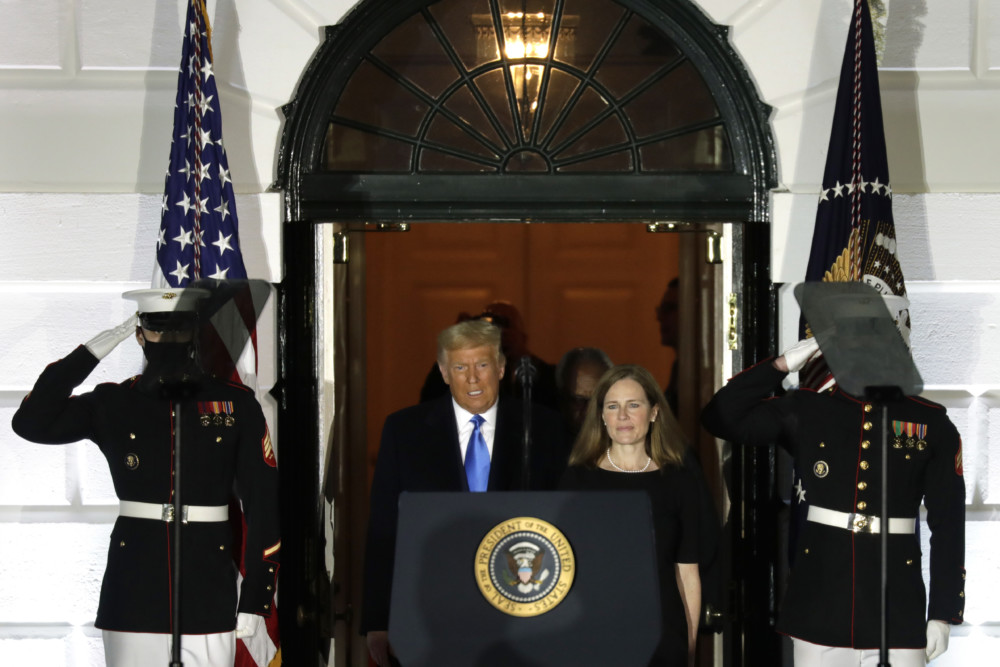By Todd Ruger
CQ-Roll Call
WWR Article Summary (tl;dr) As Todd Ruger reports, “the scheduling keeps Republicans on track to put Barrett on the court by the end of the month, days ahead of the Nov. 3 election and Nov. 10 arguments on the Affordable Care Act.”
Washington
The Senate Judiciary Committee on Thursday officially set an Oct. 22 vote on Amy Coney Barrett’s confirmation to the Supreme Court, and Majority Leader Mitch McConnell immediately announced plans to bring her nomination to the floor the following day.
The scheduling keeps Republicans on track to put Barrett on the court by the end of the month, days ahead of the Nov. 3 election and Nov. 10 arguments on the Affordable Care Act.
“She will come out of committee next Thursday the 22nd of October, and we’ll go forward with her on Friday the 23rd and stay on it until we finish,” McConnell told reporters after casting his ballot at the mass early-voting site in Louisville, Kentucky.
He left no doubt that she would be confirmed.
“We have the votes,” McConnell said.
In the Judiciary Committee, Republicans voted Thursday morning to move forward with the nomination without Democrats, essentially breaking the panel’s own rules.
Sen. Richard J. Durbin of Illinois was the only Democrat who showed up to the committee business meeting to consider the nomination, which under the letter of committee rules meant there were not two members of the minority party to form a quorum to conduct business.
Chairman Lindsey Graham responded with a motion to hold the vote at 1 p.m. EDT on Oct. 22, which Republicans backed. And the South Carolina Republican suggested Democrats would be able to do the same if Republicans tried to stop committee work.
“We’ve had this problem in the past, we’re dealing with it the way we are today,” Graham said. “If we create this problem for you in the future, you’re going to do what I’m going to do, which is move forward on the business of the committee.”
As that vote was happening, Connecticut Democratic Sen. Richard Blumenthal entered the hearing room.
The committee approved Graham’s motion on a 12-10 vote. All Democrats but Blumenthal and Durbin voted by proxy.
Blumenthal then made a motion to indefinitely postpone the committee’s consideration of Barrett’s nomination, which was not agreed to on a 10-12 vote.
Blumenthal said there has been inadequate time to consider the nomination, and pointed to undisclosed documents in Barrett’s past.
Graham responded that committee members already know the positions Barrett takes as an individual on issues such as abortion.
“There’s nothing out of the norm here in terms of the time we’ve given this matter,” Graham said. “We’ve had two days of hearings. Each member had 50 minutes so, with all due respect, we’ll call the roll.”
The committee then proceeded to the final day of its hearings for Barrett with testimony from outside witnesses that largely underscored the themes that Democrats and Republicans stressed in the prior two days of Barrett’s testimony.
For Republicans, the witnesses included Laura Wolk, a blind former student who spoke about how Barrett went out of her way to show kindness and help her with a “boundless font of energy and a radical sense of love that she is ever ready to pour out on those lucky enough to call her teacher, boss, family and friend.”
“She has given me a gift of immeasurable value, the ability to live an abundant life with the potential to break down barriers, so that I can leave this world a better place than I found it,” Wolk testified.
And University of Virginia law professor Saikrishna Prakash told the committee that those who back Barrett’s conservative approach to the law would be disappointed because she will render decisions they disagree with.
“And I don’t think that she’s going to use her position to advance her personal or religious agenda,” Prakash testified.
Democrats’ witnesses included Stacy Staggs, a mother who described how her twin girls born prematurely had already surpassed their lifetime cap for insurance by the time they were first able to leave the hospital 110 days after their birth.
“I am here today because Judge Barrett has repeatedly made statements that are hostile to the Affordable Care Act,” Staggs said. “A vote for Judge Barrett is a vote to take away health care. And a vote for Judge Barrett is a vote to strike down the law that saved the lives of my daughters. And my family is but one of many.”
And Kristen Clarke, president and executive director of the Lawyers’ Committee for Civil Rights Under Law, told senators that Barrett’s record does not reflect a strong commitment to upholding the Constitution or to fairly interpreting and apply civil rights laws.
“During these hearings, Judge Barrett has gone to great lengths to distance herself from the reality of voter suppression and voting discrimination that we face today,” Clarke said. “This should sound an alarm to anyone in our country who cares about protecting voting rights for all Americans.”
___
(Niels Lesniewski contributed to this report.)
___
Distributed by Tribune Content Agency, LLC.
















































































































































































































































































































































































